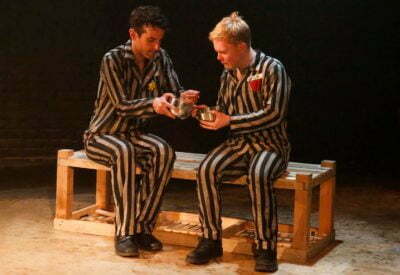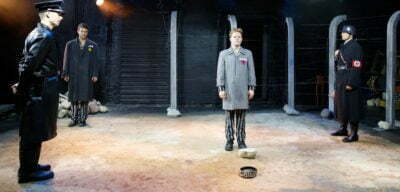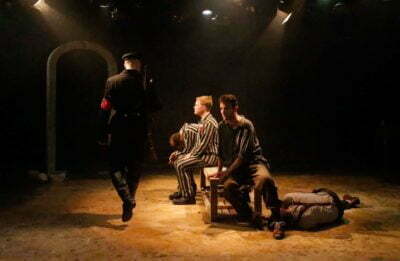Bent
Directed by Keira Fromm
Produced by Other Theatre Company
At Strawdog Theatre, Chicago
The Other Theatre Company is a new Equity company that specializes in people who have been “othered” by society. After starting their inaugural season, which is dedicated to using the stories of the past to illuminate the present, with Anna Deavere Smith’s Twilight Angeles: 1992, their focus for their second production has shifted to gays. Fortunately, under the direction of Keira Fromm, this version of Martin Sherman’s 1979 Holocaust play Bent is no checkmark on a list of minorities, but a character study into affection under the worst of circumstances. Though the status of gay issues changes rapidly, Bent’s characters are instantly recognizable, fascinating, and long-lasting.

Max (Nik Kourtis) and Rudy (Will Von Vogt) are a young couple who live in Berlin. While Rudy dances at cabarets and drag shows that are crumbling beneath the new Nazi regime, Max makes sporadic cocaine deals that, until now, have just barely kept a roof over their heads, while hooking up with pretty boys he promises to share with Rudy, and then doesn’t. Today’s lay is Wolf (Michael Carey), who is under the impression that Max is a richer patron than his current sugar-daddy, a high ranking member of the SA. But it’s the Night of the Long Knives, and when SS troops burst in to execute Wolf, it occurs to Max and Rudy that big political changes have occurred which put them in danger.
Before the end of the first act, Max and Rudy have been captured, and put on a train to Dachau. On board, a prisoner named Horst (Alex Weisman) advises Max that there is nothing he can do to help Rudy—whose glasses have marked him in the Nazis’ minds as an intellectual—and that homosexuals are the lowest level in the concentration camp prisoner hierarchy. When a guard tells Max he must beat Rudy or forfeit his own life, Max saves himself, and from then on, the play is about a new romance between Max and Horst. Along the way, Max sacrifices some more of his dignity to obtain a uniform with a Jewish star, believing it will grant him better treatment than being labeled a homosexual.

Keira Fromm guides us through the early part of the play, which includes a simple, but effective scenic design by Michael Johannsen. Von Vogt’s Rudy is a dimwit who’s his childishly earnest whining contrasts with the duplicity of Carey’s Wolf, Joe Bianco’s Greta, the drag queen who sold him out, and Stephen Rader as Max’s Uncle Freddie, who always advocated the closeted life and feels vindicated by the Nazis’ rise to power. But it’s the second act between Max and Horst that Bent is famous for, and these larger roles give Kourtis and Weisman material to show their full capacity as actors, which is considerable. After Max gets Horst transferred to join him in the pointless, but relatively safe, job of moving rocks back and forth, Horst is understandably uncomfortable, having witnessed the end of Max’s last boyfriend. As Horst, Weisman comes across as clever, willful, sarcastic, and unwaveringly moral, while Kourtis as Max gives one of the most intriguing performances I’ve seen yet. Having never learned to be open to love, and now in a situation where comradeship is necessary, but comes with guaranteed imminent sorrow, Max is vulnerable and defensive, but still a world-class charmer.
Bent is considered a landmark for gay representation in theatre and one of the few modern instances where a play made an immediate, clearly traceable contribution to social change, in this case by raising awareness of the persecution of gay people in the Holocaust. But Sherman’s need to prove that gay men are capable of falling in love with each other, and his making this Max’s epiphany, is dated. Much of the dialogue sounds similar to Larry Kramer’s The Normal Heart, which Kourtis and Weisman were in at TimeLine Theatre Company, in its defiant insistence on something anyone going to see this play already knows. Nonetheless, Bent is a character-driven story about people who were deprived of their ability to be the drivers in their own lives, and that is a rich source for drama. Even though the odds are long on concentration camp prisoners in 1934 surviving until liberation, we see people who are doomed choose love, claim their dignity, and maintain their senses of humor anyway. Fromm writes in her program note that’s what she found most interesting about Bent, and it shines through in her production.
Highly Recommended
Jacob Davis
[email protected]
Reviewed July 1, 2015
For more information, see Bent’s page on Theatre in Chicago.
Playing at Strawdog, 3829 N Broadway.


